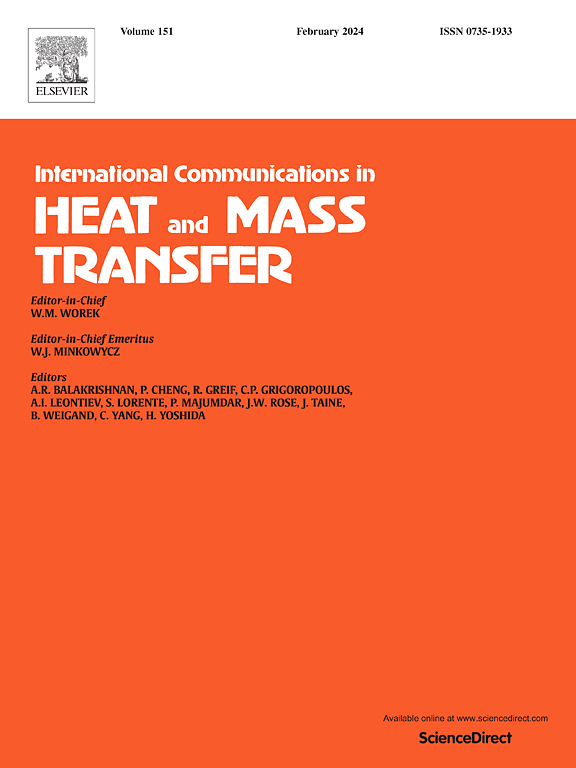硅基环形热管自润湿芯的制造与热性能提升
IF 6.4
2区 工程技术
Q1 MECHANICS
International Communications in Heat and Mass Transfer
Pub Date : 2024-11-22
DOI:10.1016/j.icheatmasstransfer.2024.108378
引用次数: 0
摘要
芯片集成度的提高导致热通量增加,使得在狭小空间内散热变得越来越具有挑战性。硅基环形热管(sLHP)提供了一种简单、可靠、易于集成的热管理解决方案。然而,干涸、有限的热交换面积和流动不稳定性等问题阻碍了 sLHP 热传导性能的进一步提高。因此,本研究设计了一种新型复合 MCC 烛芯(微通道-微柱复合电池阵列烛芯),并对其进行了实验研究。结果表明,微柱阵列提供了流体流动自由度和高热交换面积,有利于工作流体的高效蒸发。微通道通过提供连续的附着力,提高了流体流动的稳定性,促进了工作流体的定向补充。此外,拟议的 MCC 烛芯还引入了液体补充微通道,实现了烛芯的自润湿,增强了液膜蒸发。结构优化后,sLHP 的最高有效热导率达到 856 W/(m-K),明显高于其他 sLHP。这项工作有望为 LHP 的优化设计和芯片散热提供有价值的见解。本文章由计算机程序翻译,如有差异,请以英文原文为准。
Fabrication and enhanced thermal performance of a self-rewetting wick of silicon-based loop heat pipe
The improvement of chip integration has led to increased heat flux, making heat dissipation in confined spaces increasingly challenging. Silicon-based loop heat pipes (sLHPs) offer a simple, reliable, and easily integrated thermal management solution. Still, problems like dry-out, limited heat exchange area, and flow instability hinder further heat transfer improvements of sLHP. Therefore, a novel composite MCC wick (Microchannel-micropillar Composite Cell arrays wick) incorporating microchannels into the micropillar arrays has been designed and experimentally studied in this work. The results indicate that micropillar arrays provide fluid flow freedom and a high heat exchange area, benefiting the efficient evaporation of the working fluid. The microchannels enhance fluid flow stability by providing continuous adhesion, promoting the directional supplement of working fluid. Moreover, liquid-replenishment microchannels have been introduced to the proposed MCC wick, enabling self-rewetting of the wick and enhance liquid film evaporation. The highest effective thermal conductivity of the sLHP reaches 856 W/(m·K) after structural optimization, which is significantly higher than that of other sLHPs. This work is expected to provide valuable insights for the optimal design of LHPs and chip heat dissipation.
求助全文
通过发布文献求助,成功后即可免费获取论文全文。
去求助
来源期刊
CiteScore
11.00
自引率
10.00%
发文量
648
审稿时长
32 days
期刊介绍:
International Communications in Heat and Mass Transfer serves as a world forum for the rapid dissemination of new ideas, new measurement techniques, preliminary findings of ongoing investigations, discussions, and criticisms in the field of heat and mass transfer. Two types of manuscript will be considered for publication: communications (short reports of new work or discussions of work which has already been published) and summaries (abstracts of reports, theses or manuscripts which are too long for publication in full). Together with its companion publication, International Journal of Heat and Mass Transfer, with which it shares the same Board of Editors, this journal is read by research workers and engineers throughout the world.

 求助内容:
求助内容: 应助结果提醒方式:
应助结果提醒方式:


